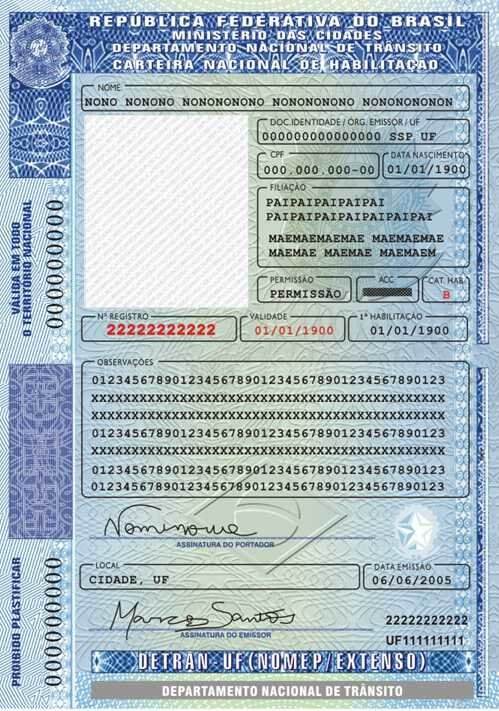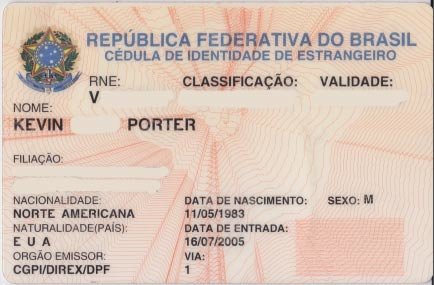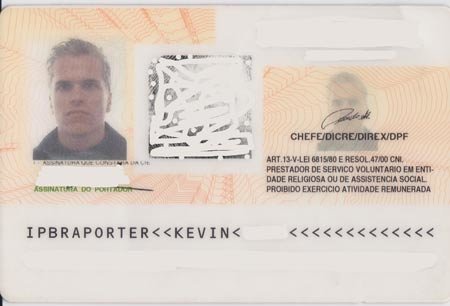 What if I told you that there are 6 documents that will get you access to most anything in Brazil?
What if I told you that there are 6 documents that will get you access to most anything in Brazil?
This is everything from the start to finish: applying for a visa, buying a house, opening a bank account, getting Internet – you name it and these documents will pretty much cover them all!
Well, I’m going to tell you what they are and how you too can get your own “Golden 6”.
Here they are:
- Translated Drivers License
- Translated Birth Certificate
- Translated Police Record
- CPF
- Proof of Residence
- Federal Police proof of ID
Before I knew about “The Golden 6”, I ran into problems at every corner when trying to get things done…
Like when I tried to get a 3G mobile Internet plan: “I’m sorry sir, but you can’t get a phone plan as we need your proof of residence”
Or when I tried to buy a wardrobe: “You cannot buy this unless you get a friend to give me his CPF number…”
Or when applying for my visa: “We need a translated police record before you can apply”.
And the examples keep coming…
I call these “The Golden 6” because with them, life becomes much easier in Brazil.
Allow me to explain exactly what these documents can be used for, why you need them and how to get them…
1. Translated Drivers License
If you are planning on driving in Brazil, you are going to want to get a Brazilian drivers license, known as a “CNH” (Carteira Nacional de Habilitação).

Here is what a generic version of a Brazilian driver’s license looks like.
As a rule of thumb, all licenses from the European Union, United States, Australia and South Africa can be exchanged without you having to retake the Brazilian driving test.
(hanging your hand out the window and signaling to other cars that you want to merge is not part of the curriculum).
How you exactly apply for and get a Brazilian license will be covered in the very near future on this site but for now, I want to get you set up so that you can get one.
Here is how you get a translated license:
- Find a sworn translator by finding one in Brazil ( to some) – documents translated abroad are not accepted.
- Submit your license to them.
- Have it translated and returned..
Money Savings Tip: if you are really good at Portuguese but not a sworn translator, many times you can arrange to do the translation yourself and have the sworn translator double check it and certify it. I have done this before and saved countless $$$.
2. Translated Birth Certificate
Next in line is your birth certificate, and you may be wondering why it’s so important when you already have a passport, which is valid international identification…
It’s because your birth certificate shows your parentage – and this is very important in Brazil.
If you are Brazilian, having proof of parentage allows you to take that proof together with something in your parent’s name, and sign up for a telephone plan etc.
As a foreigner, I have yet to understand why this matters, but it does.
You will get asked often about your parentage and they will want proof!
The steps to getting a translated proof of birth certificate is exactly the same as above drivers license, so I won’t repeat myself.
Note: you usually need to have your birth certificate legalized at your local consulate/embassy abroad before having it translated in Brazil (legalizing just means that the consulate/embassy abroad attests that the document can be used in Brazil).
3. Translated Police Record
When applying for your visa, you will need to provide them with a local police record from the place you resided within the last 5 years time, if it is 2-3 different places, then you will have to figure out a way to get one from each place.
The exception to this is if you are applying for a tourist visa or a visa based on a Brazilian dependent.
If you have committed a crime in the past, this doesn’t necessarily bar you from coming to Brazil (providing you served your sentence) but it may lead to you getting a special stamp on your ID card showing that you have been a criminal.
Getting a police record varies from place to place and usually is done at the police, though in the USA it’s done at the county office where you get weapon permits and in England through the CRB (Criminal Records Bureau).
Once you have your criminal record in hand, you submit it to be translated unless your consulate doesn’t require it.
In the USA, I didn’t have to have it translated for some reason…
Instructions on getting it translated are the same as with the drivers license above.
Note: your criminal record will need to be legalized at your local consulate/embassy before you have it translated in Brazil or else it won’t be accepted!
4. Cadastro de Pessoa Fisica – CPF
A CPF is a type of national tax payer card that is linked to the Federal Revenue of Brazil (their translation, not mine!) to keeps tabs on all assets and transactions within the country.
Anytime you purchase anything “large”, you will need your CPF number, here are some examples:
- Having a mobile phone plan
- Buying a house
- Opening a bank account
- Signing up for online services
- Purchasing a car
- Buying an air conditioner
- And so on…
A CPF number can be obtained in two ways:
- At a Brazilian Diplomatic Mission (Embassy or Consulate)
- From within Brazil through the Receita Federal (Tax Authority)
You can see my specific step-by-step directions on how to get a CPF number from Brazil right here.
Quick Tip: getting a CPF card through your embassy requires more work, is costly (under R$10 from Brazil) and several weeks before you get your number. I always recommend doing it from Brazil using my instructions.
5. Proof of Residence
A Brazilian proof of residence is the document giving credibility to where you live.
You usually need a proof of residence for things like:
- Renting videos
- Getting a post-pay phone plan
- Getting Internet
- Getting visa stuff done
- Most notary public tasks
- Buying a car
- Health insurance
- Getting a job
- And tons of other things…
This is usually a tricky document for foreigners to get as you usually need to have proof of parentage and a bill, bank statement or the like in your parent’s name to then sign up for something to have it in your name.
And you can prove your parentage with a translated birth certificate but it wont help you out any as your parents probably wont have anything in their name in Brazil…
Though, through my experiences, I was able to figure out a valid way to a proof of address without having to prove parentage.
I created the step-by-step instructions for you over here.
6. Proof of ID from the Federal Police
Many people get confused about what “proof of ID” means in Brazil.
Some think that it’s the CPF card, other’s a Brazilian “RG” (native Brazilian ID) and then some a RNE (CIE card)…
Let’s let the cat out of the bag here: your proof of ID as a foreigner in Brazil is called a RNE (Registro Nacional de Estrangeiro) number which is on a CIE (Cedula de Identidade Estrangeiro) card.

Front part of my original RNE card with sensitive info removed (notice that it has parentage on it!)

Back side of my original RNE card with sensitive info removed (that artistic design in the middle was originally my fingerprint…)
On occasion you can use your Passport as proof of ID, but many times only Brazilian Proof of ID will do.
These are cases like:
- Opening a bank account.
- Buying a car
- Getting a mobile plan
- Etc.
When you apply for any type of temporary time limited (think student or volunteer visa) or permanent visa, this number services in the place of a Brazilian RG number.
But what if you have only gotten a protocol number because your visa is being processed (maybe for years)?
Your protocol number serves as a Federal Police proof of ID until your visa is approved and you get a RNE number.
So if the bank tells you that they won’t accept it, they are wrong!
Or for that matter, if they tell you that you need an RG number, they are incorrect too – your RNE or protocol number will work.
Instructions on obtaining a Federal Police proof of ID aren’t really necessary as you get it automatically after you check in with the Federal Police in Brazil (within 30 days of arrival) when applying for your visa (protocol) or on visa approval (RNE).
Quick Note: currently, there is no way I know of to get a RNE or the like as a tourist. Though a RNE or Protocol number is not necessary if you are purchasing real estate (only CPF).
Final Words
With “The Golden 6” in hand, you are ready to embark on a successful journey in Brazil and avoid many of the problems an annoyances that plague us foreigners daily.
Have you successfully obtained any of these documents? Please share how!
Look forward to many more good posts like this to come.
Valeu – Cheers,
Kevin
P.S. please give this a thumbs up if it was helpful!

